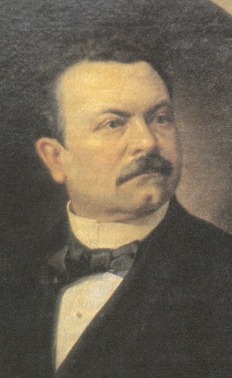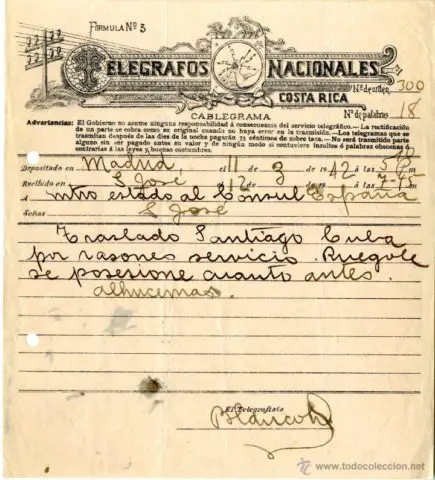León Fernández Bonilla (born in Alajuela, on February 17th, 1840 – died on January 9th, 1887) was a Costa Rican historian, lawyer, and diplomat. He is considered the ‘father’ of historiography in Costa Rica.

Director and Professor (ad honorem) of the Municipal Institute of Varones de Alajuela, he truly was a man of action. He served as Secretary of State, in whose exercise he founded the National Archives of Costa Rica. He was the Plenipotentiary Minister of Costa Rica in Madrid. The library of the Ministry of Foreign Affairs of Costa Rica bears his name.
He was declared, by the Legislative Assembly of Costa Rica, ‘Benemérito de la Patria’ (Worthy of the Homeland) on April 28th, 1994, by Agreement No. 2888 of April 28th, 1994, and published in Gazette No. 88 of May 9th, 1994.
Biographical highlights
Born in the province of Alajuela, in Costa Rica. His parents were Mr. José León Fernández y Salazar and Sebastiana Bonilla and La Peña.
His applied studies
He graduated as a Bachelor in Humanities in 1857 and after this obtained a Bachelor’s degree in Philosophy from the University of Santo Tomás, in San José. and later graduated as a Bachelor of Laws, in November 1860, at the same University. He left for Guatemala where he graduated as a Law Degree from the University of San Carlos, in May 1863.
As a legal professional, he was considered the most talented, relevant, and cultured lawyer in our country.
A man of letters
Don León also stood out as a critical and acute journalist. That is why he founded the newspaper “El Cencerro”, in 1867, whose combative character altered the village atmosphere of Alajuela at that time.
In 1869, President Jesús Jiménez ordered his expulsion, for activities contrary to his government. So, Don León went to Nicaragua; although he was pardoned 3 months later, he did not forgive the offense. Upon returning to Costa Rica, he participated in the conspiracy of April 27th, 1870. When General Tomás Guardia took office, Don León acquired political relevance and participated in the Constituent Assembly of 1871.
In 1872, he traveled to Peru, France, and London as a diplomat to promote the construction of the railroad in Costa Rica; but upon returning to our country, he broke relations with President Guardia and was confined in Tucurrique, and then in Puerto Limón, from where he escaped to San Juan del Norte.
As a historical researcher
In January 1876, he left for Guatemala, where he studied thoroughly the chroniclers of the Indies and other authors. He copied very important historical documents that clarified our past. He returned to Costa Rica in May 1876.
In July 1881, he was appointed Secretary of the Treasury and then promoted the creation of the National Archives and the National Statistics Office. In August of that year, the first volume of his valuable work “Collection of documents for the history of Costa Rica was published”
In mid-1882, he was appointed Minister Plenipotentiary to European governments. There he defended our territorial rights, questioned by the Colombian government. In 1883, he took on the Directorate of the National Archives.
National Archives Foundation
His work as a historian was extraordinary. With the creation of the National Archives, he compiled, classified, and ordered all documents before 1850 in the towns of the country. His greatest contribution is in the work “Collection of documents for the history of Costa Rica”, published between 1881 and 1907.

It is important to note that his work is a must for scholars of the colonial period and the understanding of the history of our country. For this reason, he is considered the father of Costa Rican historiography.
”It is pertinent to point out that Don León discovered his vocation for the study of national history during his childhood when he learned a story his father wrote about the events that took place in the country between 1835 and 1842. Then, throughout the 1870s, when he was a law student in Guatemala, he became familiar with the archives.
Later, he traveled to Spain with a very specific purpose: to find documentary evidence that supported Costa Rica’s rights in the bordering issue with Colombia. Then, with the same purpose and intending to conclude law studies, he returned to Guatemala, where in addition to meeting the “Indian historians”, he made an enormous work of document collection.
By then, I was convinced that “the history of Costa Rica was yet to be written.” The previous finding prompted Don León -in his own words- to “undertake a painful and long work, such as the study of the archives”.
Collection of documents
In 1881, he had collected a significant amount of documents in Guatemala and Spain (some unpublished found in the ‘Archive of the Indies’). And although some progress had been made in Costa Rica regarding the organization of public archives, there was still much to be done, because those documents were lost continuously.
Therefore, when he was appointed in 1881, Secretary of State in the Office of the Treasury, Commerce, and Police, he proposed “the creation of a national archive, where all kinds of documents before 1850 were collected and saved. My idea was understood and accepted, and I started the arrangement of the file”. Thus, through decree 35 of July 23rd, 1881, the so-called ‘National Archives’ were created.
Don León Fernández Bonilla was also director of that nascent institution between 1881 and 1883, and from the beginning of the 1880s and until his death, which occurred in 1887, he displayed a remarkable work in the so-called question of limits.
To defend the rights of the country, he needed solid documentary evidence and, to do so, in 1882, before leaving for Europe, he tried to find as many “documents related to the borders” as possible, in Costa Rica and Guatemala. In this latter country, he obtained permission to “transfer all the papers” relevant to his mission to the Archives of Costa Rica.
After examining these documents and working on the organization of the Archive, he moved to the old continent, and there he continued in the “search for any document capable of serving me for the defense of the country”.
With that aim, in Madrid he delved into the National Library, the Royal Academy of History, San Isidro, the Hydraulic Directorate, and the Ministry of War; in Seville, in the General Archives of the Indies; in Paris in the National Library and the Geographic Society; and London, in the British Museum and the Geography Society.
His married life
He married, in 1865, to Isabel Guardia Gutiérrez, who was President General Tomás Guardia Gutiérrez’s sister. They had 2 children, Ricardo and Clemencia.
His death
On August 11th, he had a duel with Dr. Eusebio Figueroa, who died in it. On January 3rd, 1887, when taking a train to Alajuela, Don León was the victim of the bullets fired by Antonio Figueroa, Don Eusebio’s son. He died on January 9th, 1887.


